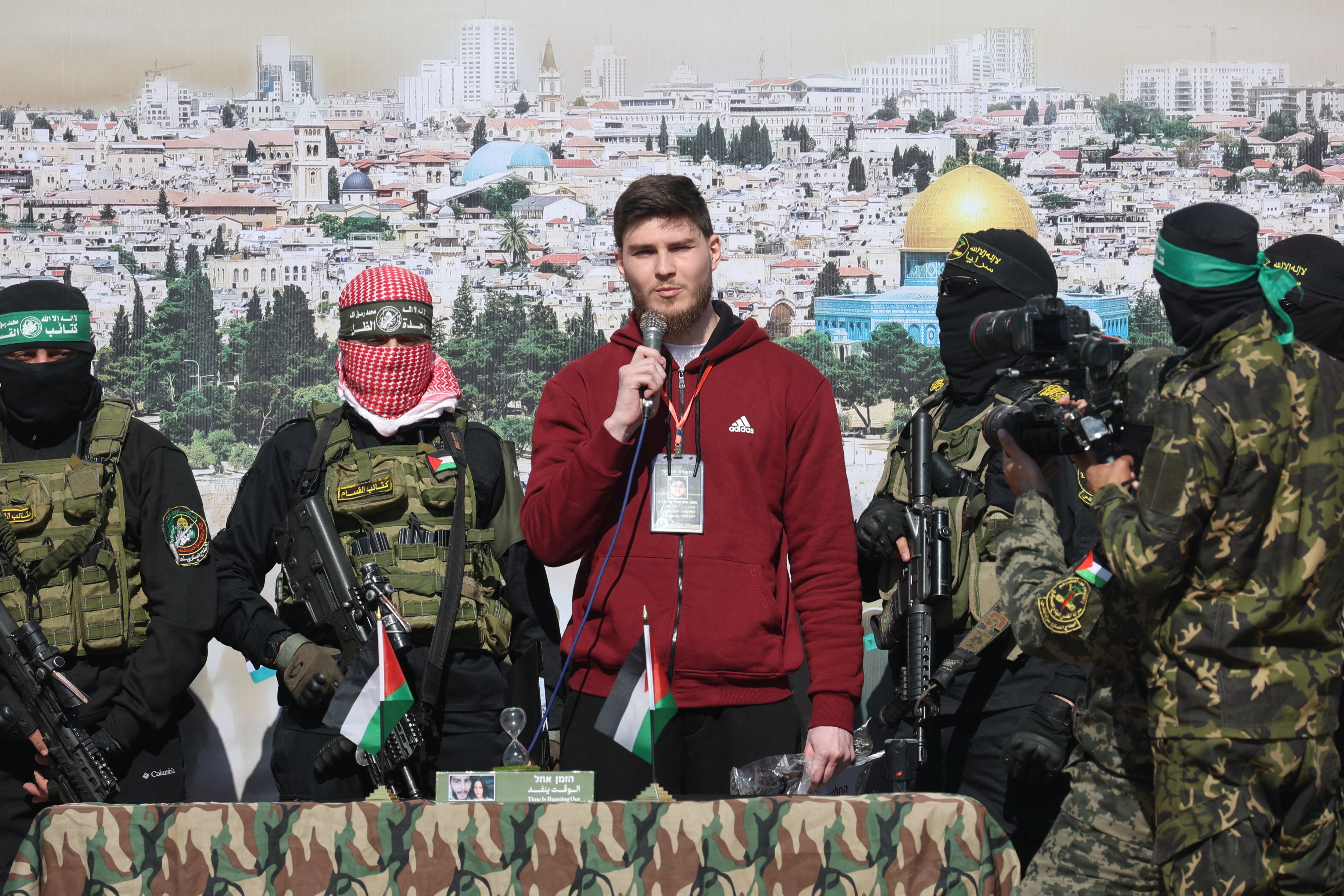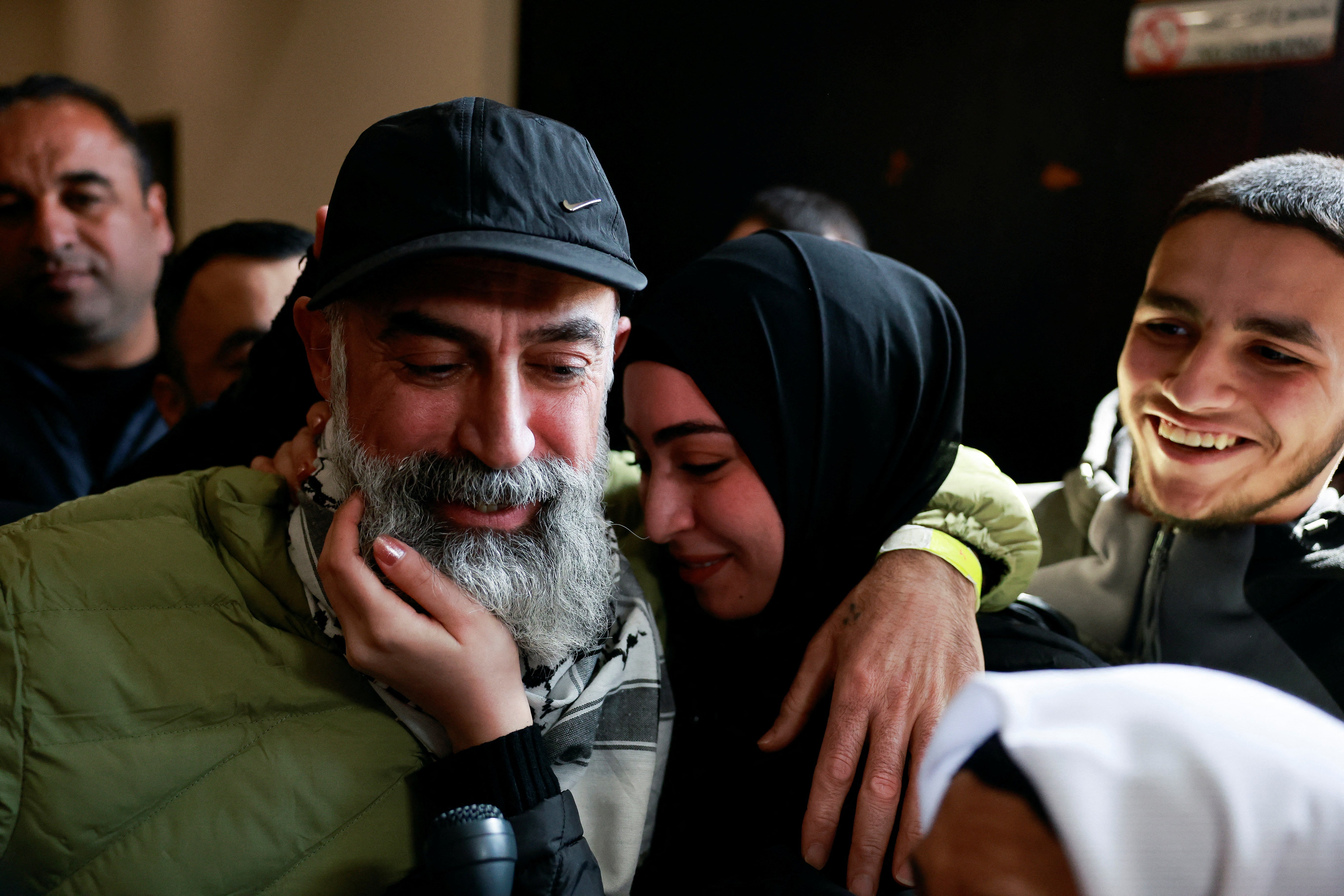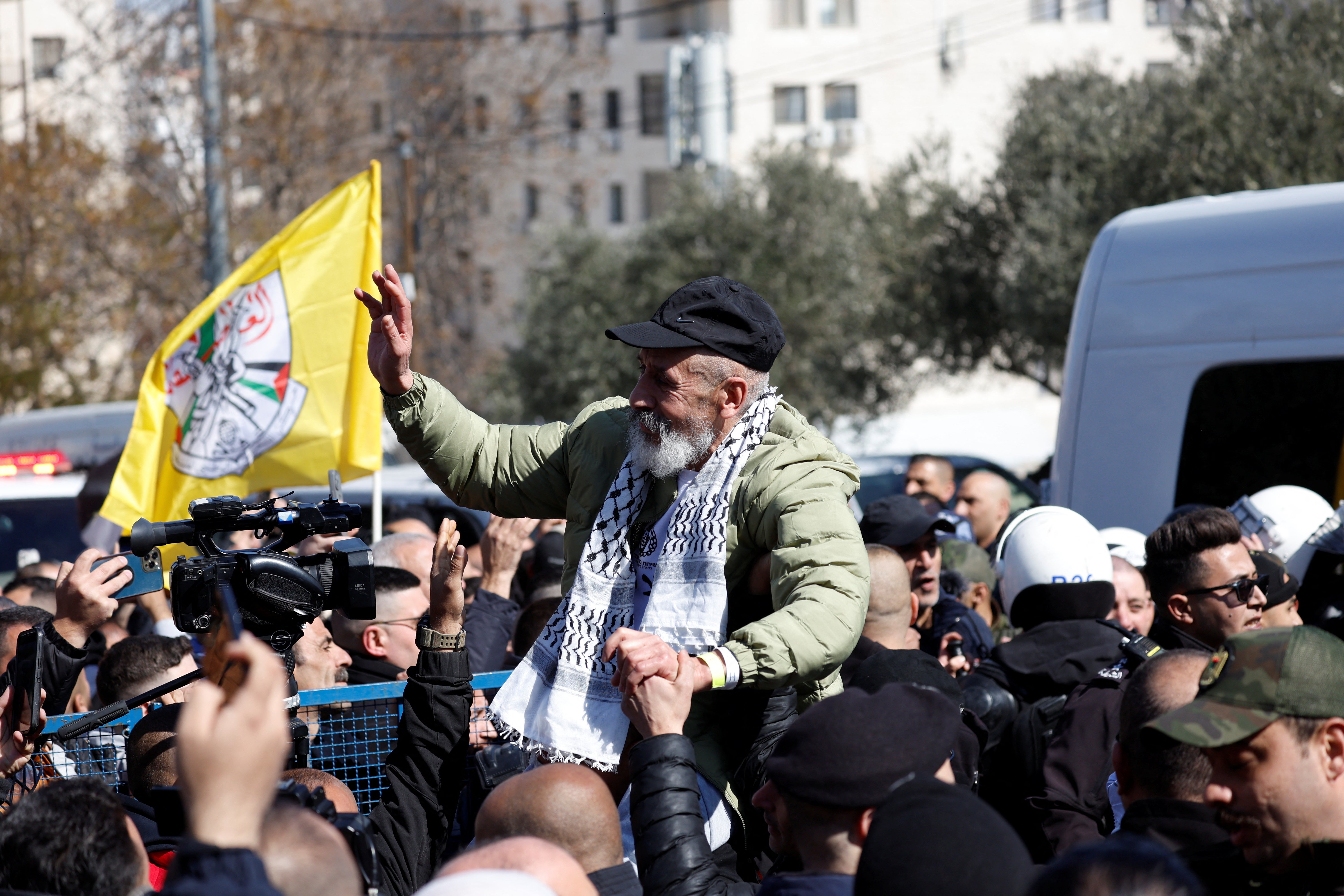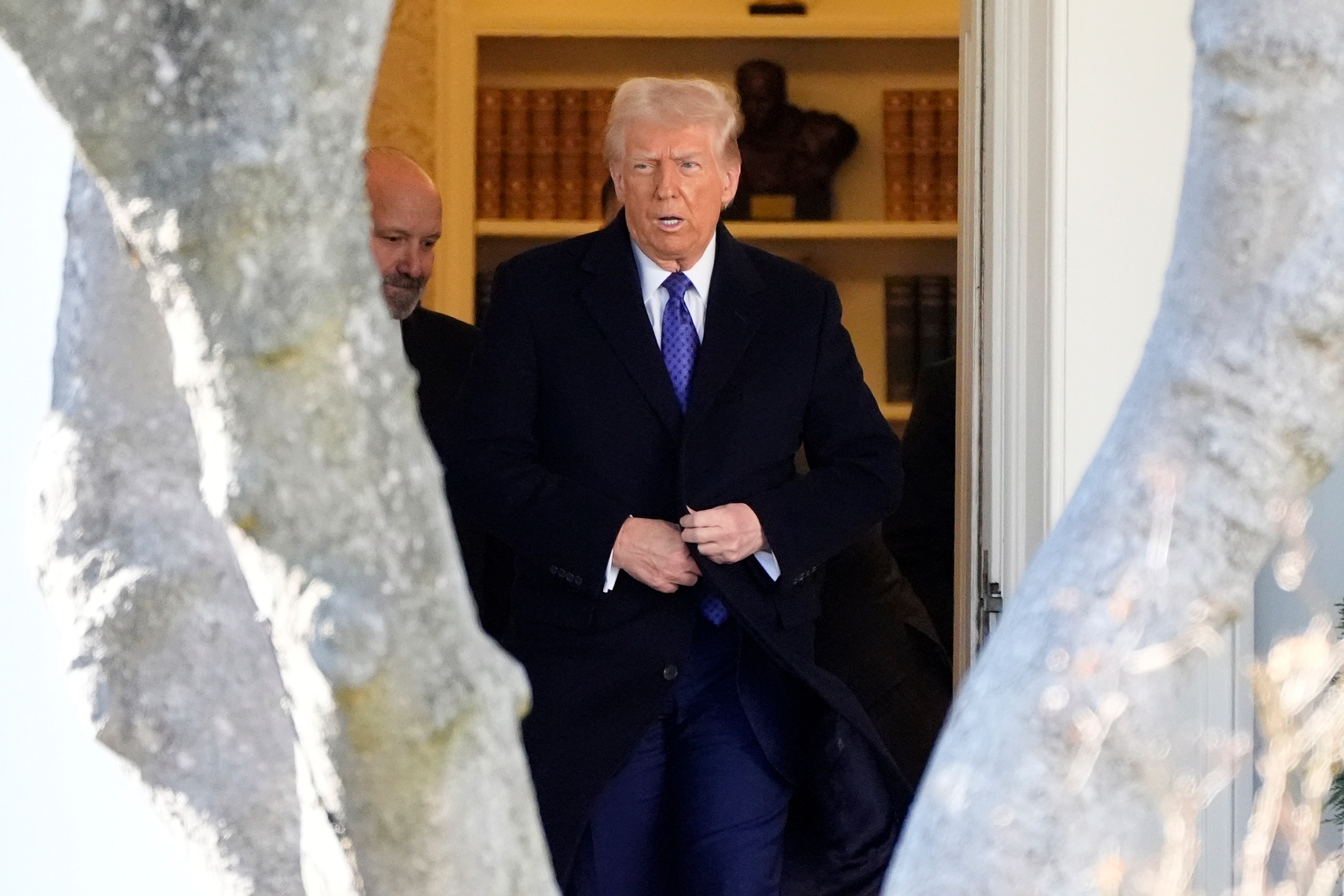Hamas militants released three male Israeli hostages held for nearly 18 months on Saturday after a tense standoff with Israel this week saw the fragile ceasefire pushed to the brink of collapse.
Iair Horn, 46, a dual citizen of Israel and Argentina; American-Israeli Sagui Dekel Chen, 36; and Russian-Israeli Sasha (Alexander) Troufanov, 29, were paraded by heavily armed militants on stage in the southern city of Khan Younis before being driven to Israel.
All were abducted from Nir Oz in the October 2023 attack that ignited the war.
More than 360 Palestinian detainees were also released on Saturday. Among them were over 300 Palestinians from Gaza detained since 7 October and 36 serving life sentences, according to the Palestinian commission for detainees.
Eleventh-hour negotiations by Qatar, Egypt and the US pulled the fragile truce back from the brink, allowing the release of the three hostages. They appeared pale and worn on Saturday but seemed to be in better physical condition than the three men released last week, who had emerged emaciated and sick, sparking uproar in Israel.
The family of Iair Horn, who has diabetes and so needs regular medical assistance, said they “can breathe a little” now he is free. But they added his brother Eithan, 38, remains in Gaza and is not part of the first stage of the ceasefire.
The family of American-Israeli father of three, Dekel Chen, said on Saturday he would meet his baby daughter Shahar for the first time as she was born while he was in captivity.

The truce – which is only the first of three yet-to-be-fully-negotiated stages – came the closet yet to total collapse this week when Hamas had said it was postponing the next hostage releases, accusing Israel of violating the terms of the agreement, including shelling the territory and not allowing in shelters and humanitarian aid.
Israel’s leaders hit back with counter-claims and threatened to pull out of the agreement. Mr Netanyahu ordered reserves to be called up, soldiers’ leave was postponed, and military officials told The Independent they had deployed additional troops to the border regions.
US president Donald Trump waded in, in a typically bombastic fashion, threatening on Tuesday “all hell is going to break loose” if Hamas reneged on the ceasefire deal that only came into effect a month ago.
The original deal was the culmination of a year of furious and often frustrating negotiations by the US, Egypt, and Qatar. Doha – which has been one of the key hosts – even said at one point in November it would no longer negotiate unless both sides showed a “sincere willingness”, with insiders saying, “If you’re hit with a wall, there’s no use.”
A person briefed on the negotiations painted an extraordinary picture of the frantic efforts to get the deal sealed right until the final seconds – underscoring how fragile the Gaza ceasefire is.

The prime minister of Qatar, a Qatari royal, shuttled in an elevator between two floors of a building, delivering messages between the rival camps in the final minutes of negotiations before 17 January. The late introduction of a wildcard, in the shape of Steve Witkoff, a billionaire real estate investor turned Mr Trump’s Middle East envoy, who spent weeks travelling around the region, was the “fresh energy” that was “instrumental in getting the deal over the line”.
Three delays at the eleventh hour: hitches which were only resolved literally a minute before the press conference to announce the truce was due to start on the ground floor of that same building in Doha.
The delays and the uncertainty panicked families of the 76 hostages still remaining in Gaza, who say they are “terrified” their loved ones will not survive if there are any further delays to the process.
It has also worried families in Gaza, who had just returned to the devastated north of the strip after months of bloodshed and feared they would be forced to flee again, and that moved loved ones would be slaughtered. In many ways, the hard work has only just begun.
The completion of phase one – during which 33 hostages are set to be released in exchange for nearly 2,000 Palestinians in Israeli prisons – is only the first baby step on the road to long-term peace.

Halfway through phase one, talks on the parameters of phase two are supposed to be well advanced, so that – as one person briefed on the talks told me – there can be a seamless “smooth transition” once the first six-week period is over.
The second phase of the deal should see the release of all remaining hostages, including male soldiers, more Palestinian detainees freed, and a complete withdrawal of Israeli forces from Gaza. It is unclear how much progress has been made on how to achieve this, given all the upheaval of recent days.
And it will certainly have been made harder in the wake of Mr Trump’s recent threats. The US president has angered his allies in the Middle East region by repeatedly saying the US is “committed to buying and owning Gaza” and that neighbouring countries like Jordan and Egypt should take in Gaza’s two-million-strong population.
They have been aghast at his suggestion to “clean out” the besieged strip.
Such a powerful actor – and supporter of Israel – unilaterally presenting a final vision that includes the mass forced displacement of Palestinians before phase one has even been successfully completed and nothing else has been negotiated, can only be incredibly destabilising.

Insiders say that right now is a vital moment to push ahead to the next stage: “The release of hostages, detainees, and the flood of aid hadn’t been seen in over a year. That’s why it’s important for us to begin phase two negotiations. This is our focus at the moment.”
An Israeli delegation has been in Doha this week – but Israeli media has reported that it is just “a show” and that they have been given “no real mandate” or incentive to pursue phase two. News outlets including Haaretz and The Times of Israel reported prime minister Benjamin Netanyahu has chosen confidant and strategic affairs minister Ron Dermer to lead the team rather than David Barnea, head of Israel’s Mossad intelligence agency, who has headed up high-level talks before.
This, they say, signals his politicisation of the talks. It has deeply worried regional actors, including Egypt and Saudi Arabia, who have reportedly been frantically developing their own alternative to Mr Trump's “Middle East riviera” cleared of its Palestinian inhabitants.
Draft plans will reportedly be discussed at a meeting in Riyadh this month, which countries including Saudi Arabia, Egypt, Jordan, and the United Arab Emirates will attend. Among the ideas may involve a Gulf-led reconstruction fund and a deal to sideline Hamas, sources told Reuters.
Meanwhile, civilians on both sides of this nightmare are desperate for a resolution before more lives are needlessly lost. Now, they believe, is the time to negotiate and act.







